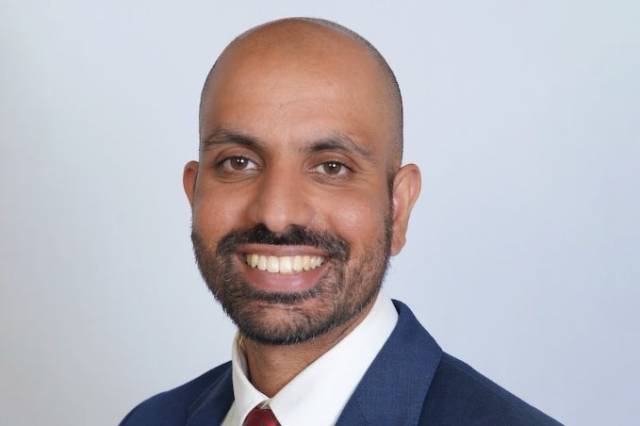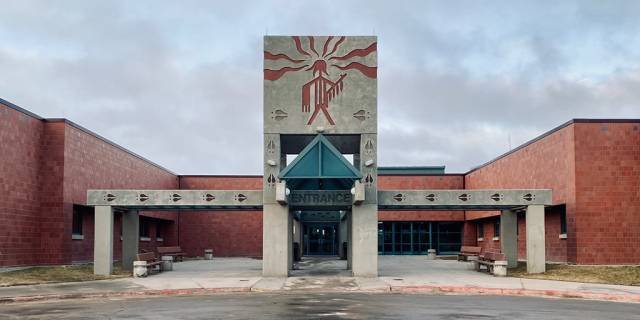You are here
Delivering Care in Pine Ridge, South Dakota
The Oglala Lakota Sioux reservation of Pine Ridge in South Dakota is one of the largest in the country and is home to approximately 18,000 people, many of whom live in remote areas across nearly 2 million acres of land. For the past year, obstetrician-gynecologist (OB/GYN) Ryan Duggal, MD, has been serving as a staff physician with the Indian Health Service in Pine Ridge. From the outset, he felt right at home.
“Everyone was extremely welcoming, which was really nice,” Dr. Duggal said. “People made meals for me; we ate together. I felt very welcome the moment I got here.”
The people of Pine Ridge face many socioeconomic challenges, including high rates of unemployment and poverty and limited access to health care and services. When Dr. Duggal arrived, the hospital didn’t have a full-time OB/GYN, and often the facility could not offer labor and delivery services.
“People were having to drive two hours to the closest city to give birth. For anyone, that's hard, but in Pine Ridge, there's a lot of poverty and inability to access transportation, so that’s really, really difficult for them,” Dr. Duggal said. “If they're able to deliver their babies on the reservation, where they've lived their whole lives, where generations of their families have lived, I think that is a really rewarding thing.”
In addition to seeing patients, Dr. Duggal has been receiving training in public health through the CDC Foundation Gilstrap OB/GYN Fellowship. The one-year program provides recent OB/GYN residents with the opportunity to work with the Centers for Disease Control and Prevention (CDC), where they partner with mentors to create their curriculum, get research support and develop a strong foundation in emerging public health issues in maternal and fetal health.
“In OB-GYN, we interact with a lot of public health systems, and a lot of the diseases and conditions that we treat are very much related to broader public health concerns,” Dr. Duggal said. “Having that public health training allows me to have a better perspective when speaking to patients and better connect them with resources and provide evidence-based care.”
Through the fellowship, Dr. Duggal has strengthened his skills in disease research and data analysis, recently focusing his research on syphilis and its impact on women’s health. According to CDC, reported cases of syphilis are on the rise in the U.S., and while the disease is treatable, the risk of serious complications from syphilis is higher among those who cannot readily access or afford care, including among remote tribal communities like Pine Ridge. Babies who are infected in the womb are especially vulnerable.
“Syphilis is a disease born out of economic hard times, and it has been a huge health issue on the reservation,” Dr. Duggal said. “It can lead to permanent disability or stillbirth or neonatal death in children and fetuses, but if you're able to see women in prenatal care, test them for syphilis, treat them, you can prevent a lot of the long-term complications.”
Having that public health training allows me to have a better perspective when speaking to patients and better connect them with resources and provide evidence-based care.
This summer, Dr. Duggal’s Gilstrap Fellowship comes to an end, and he will begin a new training program at the University of California San Francisco in maternal fetal medicine, a specialty that focuses on the diagnosis, treatment and management of high-risk pregnancies. He plans to draw on the knowledge he gained through the Gilstrap Fellowship and his experience working with patients in Pine Ridge.
“I'm really excited to apply a lot of the research skills and public health knowledge I have to this field,” Dr. Duggal said. “And to continue to work to better understand rural communities, the things that they need, especially from a high-risk pregnancy perspective.”
Learn more about the Gilstrap OBGYN Fellowship.
This project was supported by the Centers for Disease Control and Prevention of the U.S. Department of Health and Human Services (HHS) as part of a financial assistance award totaling $805,000 with 100 percent funded by CDC/HHS. The contents are those of the author(s) and do not necessarily represent the official views of, nor an endorsement by CDC/HHS or the U.S. Government.



